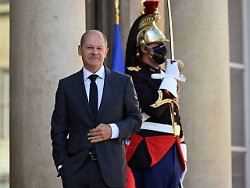Friday 10th December 2021
Looking for a common strategy
After Baerbock, Scholz also travels to France
France has always been the first destination for new chancellors. Olaf Scholz also sticks to this tradition. Then it’s off to Brussels – no surprise either. Merkel did the same thing 16 years ago. But there was also a difference back then.
Two days after being sworn in as Federal Chancellor, Olaf Scholz set off on his first trip abroad to Paris and Brussels on Friday. The SPD politician will meet President Emmanuel Macron in the French capital, and talks with EU Commission President Ursula von der Leyen and NATO Secretary General Jens Stoltenberg are on his program in Brussels.
Even before his election as Chancellor, Scholz had announced that his first trip abroad would be to Macron in Paris. “We are meeting to develop a common strategy with France,” he said at a press conference the evening before. “That is the spirit from which cooperation arises, we work very hard on it.” Macron had also conjured up German-French cooperation for Europe on Wednesday in his congratulations to Scholz on Twitter. “We will write the next chapter together. For the French, for the Germans, for the Europeans,” he wrote.
Dissent on the issue of nuclear power
Foreign Minister Annalena Baerbock visited Paris and Brussels on Thursday. A strong Europe needs strong Franco-German impulses, she also said. However, there was no 100 percent harmony on her visit. Baerbock reiterated her rejection of the French plans to classify nuclear power as “green” energy: “It is well known that we have different positions on the nuclear issue,” she said. Scholz said on the question that the approaches to coping with climate change are different all over the world. It is about “creating a force that makes it possible to march towards the same goal in different ways, but at the same time also to create something that one can communicate with one another”.
The activists of Fridays for Future called on Scholz to take a clear position in Paris against a green label for nuclear power. “The Franco-German friendship must not be misused to declare fossil gas and radiant nuclear energy to be green,” said activist Carla Reemtsma.
The first inaugural visit by Chancellors traditionally goes to France. Gerhard Schröder was in Paris in 1998 even before his election as head of government. In 2005, Chancellor Angela Merkel and her then Foreign Minister Frank-Walter Steinmeier flew together to Paris and then to Brussels.
Scholz has not yet set a course
This time Baerbock is one step ahead of Prime Minister Scholz with her inaugural visits. The Foreign Minister is on Friday in Poland, Germany’s second largest neighbor after France. Scholz is not expected in Warsaw until Sunday. How well the cooperation between the two in foreign policy will work is one of the exciting questions for the first months of the first traffic light coalition of the SPD, Greens and FDP at federal level. Baerbock is calling for a tougher course towards China. Merkel was more interested in dialogue, Scholz has not yet positioned himself. The US in particular is urging to be more tough on its “system rival” China.
There are also differences in Russia policy. The Greens clearly reject the Nord Stream 2 Baltic Sea pipeline between Russia and Germany. Here, too, it is still unclear how Scholz will behave – especially with a view to the Russian troop deployment near the Ukrainian border.
“The government works together for our country, and we will also act together, also in matters of foreign policy or European policy,” Scholz asserted. SPD parliamentary group leader Rolf Mützenich had previously turned against the Greens by saying that German foreign policy was being steered “especially in the Chancellery”. Foreign politician Omid Nouripour railed against an outdated “cook-waiter logic”.
Overall, Scholz promised continuity in German foreign policy and demonstrated this together with Merkel at the G20 summit in October. Both appeared there as a kind of dual leadership and completed the most important appointments together with US President Joe Biden, among others.
In addition to Russia and China policy, there are other areas in which it could be difficult with the seamless transition between the two governments. These include two NATO topics that Secretary General Stoltenberg could address on Thursday. The alliance’s goal of each member state spending two percent of its gross domestic product on defense is not mentioned in the coalition agreement. And it does not include a commitment to Germany’s participation in NATO’s nuclear deterrent, i.e. to the continued stationing of US atomic bombs in Germany. On both issues, not only the Greens, but also parts of the SPD are in favor of a course correction.
